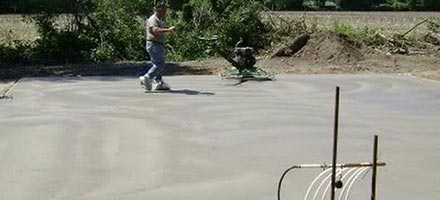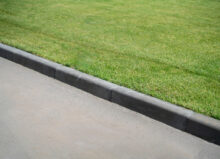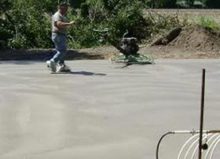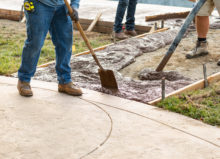How Long Is the Cure Time for a Concrete Driveway?

The average total cure time for a concrete driveway is 28 days. However, there are many factors that can affect the total cure time, including weather, finishing techniques, the concrete mix itself, and slab placement. It’s also important to note that many people often mistake “drying” for “curing” although they are two entirely different processes.
The Difference Between Drying & Curing
To differentiate between drying and curing, we need to first define each process.
Curing
Curing, or the processing of hardening concrete, typically begins right after the concrete has been poured. The process itself has three primary functions:
- To keep water in the concrete early in the hardening process
- Limit the loss of water from the concrete surface
- Expedite strength gain using additional moisture and heat
Drying
The drying process begins once the concrete cures. It’s achieved by letting excess water evaporate through the surface which is then replaced by water within the concrete, moving to the capillaries and surface. The process can go on as long as the surrounding air can hold more water vapor.
When a slab is fully cured, the area must be covered to keep the surface from absorbing extra moisture. Some of the most common factors that can affect the drying process after cure include:
- Ambient relative humidity
- The temperature of the slab
- Air temperature
If the relative humidity (amount of water vapor in the air) is consistently above 80%, it can prevent the concrete from drying completely.
Can You Speed Up the Curing Process?
Yes, it’s possible to speed up the curing process. However, the environment itself can affect the curing process. And, the environment cannot be controlled unless the concrete is being poured indoors. If you’re applying concrete outdoors, you’ll want to wait until the temperature is warm enough. You shouldn’t be pouring concrete in the late fall, winter, or early spring when the temperatures are inconsistent or too cold. Additionally, waiting until a sunny day can also help speed up the curing process.
Beyond waiting for ideal temperatures/weather, the following practices can help you increase curing time:
- Use the correct amount of water in the mix. Too much water in your mix can increase drying time.
- Add calcium chloride to the concrete mix to increase hydration speed.
- Cover the concrete with plastic sheets. This will help the concrete retain moisture, which will speed up the curing process.
- Add warm water to the concrete mix. As previously mentioned, water in concrete speeds up curing, and warmer water can encourage chemical reactions within the mix. It’s important to note, however, that extremely hot water can actually damage the concrete, so be sure the water is warm, not hot.
Factors That Affect Curing Speed
Humidity and temperature are the two most significant factors affecting curing speed. Generally, higher heat and relatively high humidity will speed up the curing time, but it’s also important to remember that high humidity can also impact the drying time of concrete after it has cured. Additional factors include the location of the slab (is it ever exposed to sunlight?), the size of the slab, and what type of concrete mix you use.
When Can You Walk on a New Concrete Slab?
Although cure time for a concrete driveway is usually about four weeks, you can usually walk on your driveway around 24 hours after you’ve poured the concrete. Most contractors, however, will recommend waiting 48 hours to walk on a newly poured driveway.
Running, scuffling, pivoting, and dragging feet must be avoided as they could cause permanent damage to the concrete. You’ll also want to keep bikes, rollerblades, skateboards, and pets away from the concrete for at least three days.
When Can You Drive On Newly Poured Concrete?
You can park and drive on a new concrete driveway around seven days after the slab has been poured. By this time, your concrete driveway will have attained over 70% of its potential strength. However, you still need to take precautions until the concrete is completely ready.
For example, you should never drive or park heavy vehicles like trucks and RVs on your new driveway when the concrete is still curing. You’ll want to wait the full 28 days/four weeks, or until your driveway is fully cured and dry before driving or parking heavy vehicles on it. You should also avoid driving near the edges of a driveway as they are more vulnerable to damage.
Start Your Concrete Driveway Construction Project Today
Successfully executing a concrete driveway construction project can be challenging. That’s why you need a professional like G&G Concrete Construction by your side. Founded over 20 years, we’re proud to be a leading commercial and residential concrete contractor in Michigan. We can help you install, repair, and maintain concrete driveways and other concrete structures. Contact us today to learn more about our services or to request a project consultation.








